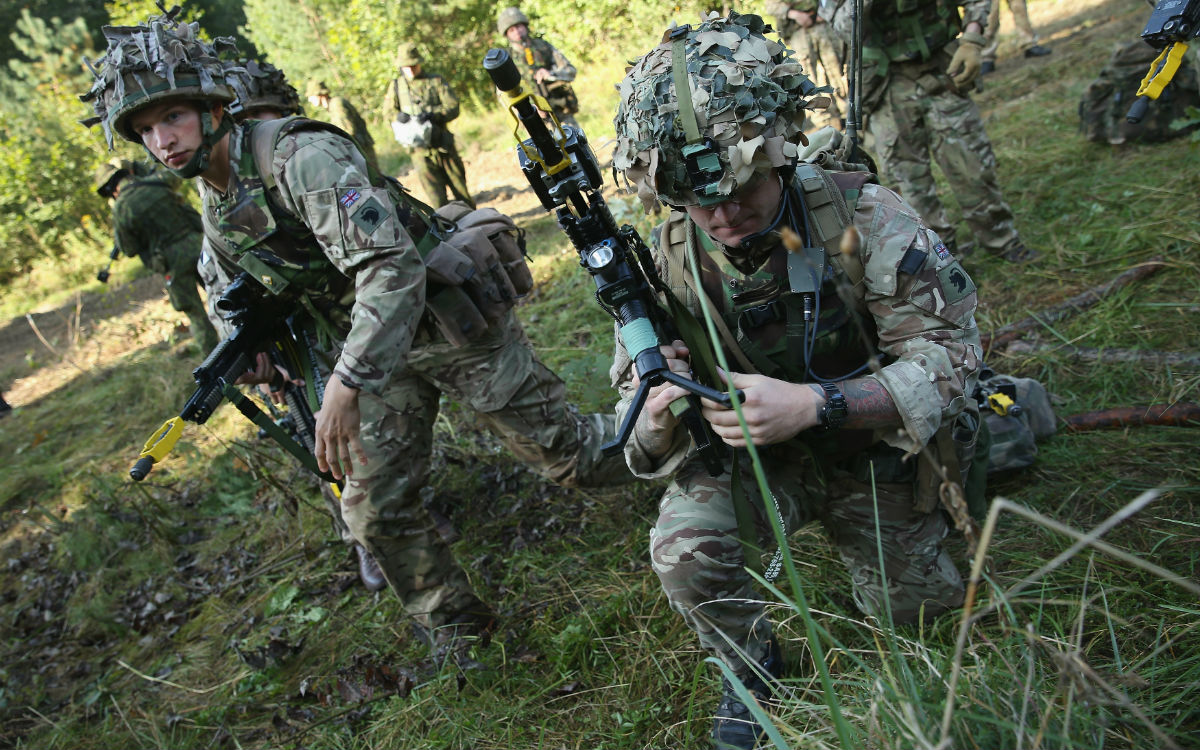UK commits to long-term troop deployment in Baltic states
Move 'likely to raise hackles' in Moscow, which has accused Nato of trying to militarise border territories

A free daily email with the biggest news stories of the day – and the best features from TheWeek.com
You are now subscribed
Your newsletter sign-up was successful
Defence secretary Michael Fallon has committed the UK to a long-term troop deployment in the Baltic states to deter Russian aggression.
The length of the deployment will be open-ended but it will work on a rotational basis with the US and Germany, in line with post-Cold-War agreements about permanent troop placements in former Eastern Bloc nations.
The UK deployment will form part of the "Transatlantic Capability Enhancement and Training" initiative, first agreed in June between Germany and the US, which is designed to increase training and exercises with less militarily-equipped European allies.
The Week
Escape your echo chamber. Get the facts behind the news, plus analysis from multiple perspectives.

Sign up for The Week's Free Newsletters
From our morning news briefing to a weekly Good News Newsletter, get the best of The Week delivered directly to your inbox.
From our morning news briefing to a weekly Good News Newsletter, get the best of The Week delivered directly to your inbox.
"The move is almost certain to raise hackles in Moscow," says the Financial Times. "Russia has long accused Nato of encroaching on its sphere of influence and attempting to militarise territories along its border."
While the UK contingent is only likely to comprise around 100 troops, the deployment is still a "marked change in Britain's posture", says the newspaper.
The UK is already deploying RAF jets to the Baltic states and around 75 military trainers are running programmes for Ukrainian troops. The defence secretary also revealed plans in August to double the resources in Ukraine, where President Petro Poroshenko has said he is trying to regain control of its eastern border with Russia.
"Now we will have a more regular drumbeat of troops deploying in the Baltics and Poland," said Fallon ahead of yesterday's Nato defence ministers meeting in Brussels.
A free daily email with the biggest news stories of the day – and the best features from TheWeek.com
Nato members also renewed its promise to defend allies in relation to Russia's "escalation" in Syria, with thousands of troops prepared to go to Turkey, which has condemned Moscow for violating its airspace.
Nato secretary-general Jens Stoltenberg said the organisation would send a "clear message" to its allies: "Nato will defend you, Nato is on the ground, Nato is ready."
-
 Rubio boosts Orbán ahead of Hungary election
Rubio boosts Orbán ahead of Hungary electionSpeed Read Far-right nationalist Prime Minister Viktor Orbán is facing a tough re-election fight after many years in power
-
 Hyatt chair joins growing list of Epstein files losers
Hyatt chair joins growing list of Epstein files losersSpeed Read Thomas Pritzker stepped down as executive chair of the Hyatt Hotels Corporation over his ties with Jeffrey Epstein and Ghislaine Maxwell
-
 Political cartoons for February 17
Political cartoons for February 17Cartoons Tuesday’s political cartoons include a refreshing spritz of Pam, winter events, and more
-
 Epstein files topple law CEO, roil UK government
Epstein files topple law CEO, roil UK governmentSpeed Read Peter Mandelson, Britain’s former ambassador to the US, is caught up in the scandal
-
 Iran and US prepare to meet after skirmishes
Iran and US prepare to meet after skirmishesSpeed Read The incident comes amid heightened tensions in the Middle East
-
 Israel retrieves final hostage’s body from Gaza
Israel retrieves final hostage’s body from GazaSpeed Read The 24-year-old police officer was killed during the initial Hamas attack
-
 China’s Xi targets top general in growing purge
China’s Xi targets top general in growing purgeSpeed Read Zhang Youxia is being investigated over ‘grave violations’ of the law
-
 Panama and Canada are negotiating over a crucial copper mine
Panama and Canada are negotiating over a crucial copper mineIn the Spotlight Panama is set to make a final decision on the mine this summer
-
 Why Greenland’s natural resources are nearly impossible to mine
Why Greenland’s natural resources are nearly impossible to mineThe Explainer The country’s natural landscape makes the task extremely difficult
-
 Iran cuts internet as protests escalate
Iran cuts internet as protests escalateSpeed Reada Government buildings across the country have been set on fire
-
 US nabs ‘shadow’ tanker claimed by Russia
US nabs ‘shadow’ tanker claimed by RussiaSpeed Read The ship was one of two vessels seized by the US military